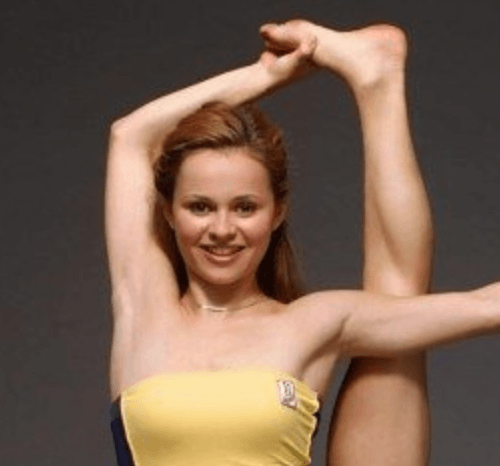In this episode, Sasha Cohen, former US Olympic figure skater, discusses the most challenging things about life as an Olympian—the unfathomable pressures, enormous expectations, years of sacrifice, and your entire life’s work culminating in just a few minutes on the world stage which, once over, leads to a loss of identity resulting in many former Olympians suffering with depression. We begin by talking about everything that led up to her unforgettable moment from the 2006 Olympics, and how she handled herself so beautifully in the face of disaster. Most importantly, we talk about post-skating life when she shares many insights such as the downside of constantly striving for a moment, the hollowness of achievement, and the importance of redefining our definition of success.
Subscribe on: APPLE PODCASTS | RSS | GOOGLE | OVERCAST | STITCHER
We discuss:
- Sasha’s mindset going into the 2006 Olympics as the favorite [6:30];
- Figure skating basics, scoring, short program vs. long program, etc. [13:40];
- Sasha’s unforgettable performance at the 2006 Olympics [18:10];
- Win, lose, or draw, why many Olympians suffer from a loss of identity [32:30];
- Dealing with the disappointment of “losing the gold” [40:30];
- The tiny window of opportunity for Olympians, and the overwhelming pressure to meet expectations [49:30];
- Sasha’s unique childhood, finding figure skating, and channeling her hyperactive personality into becoming an amazing skater [1:01:30];
- The consequences of extreme training at a young age, and trying to control the uncontrollable [1:10:00];
- What is driving extreme athletes and Olympians to be the best? [1:18:30];
- Why many former Olympians and athletes struggle with depression [1:25:00];
- Refining success—How Sasha overcame her own loss of identity [1:32:30];
- What advice would Sasha give her 15-year-old self? [1:40:45];
- Lessons we can learn from watching the rapid downfall of many former Olympians [1:45:00];
- Advice for people who are tying their identity to being “successful” or striving to be “the best” [1:56:00];
- Life lessons Sasha wants to apply to being a mother to her baby boy she is expecting [2:05:00]; and
- More.
Get Peter’s expertise in your inbox 100% free.
Sign up to receive An Introductory Guide to Longevity by Peter Attia, weekly longevity-focused articles, and new podcast announcements.
Before beginning this podcast episode, take a moment to watch Sasha’s long program performance at the 2006 Olympic games:

Sasha’s mindset going into the 2006 Olympics as the favorite [6:30]
- Fast forwarding to age 21
- Sasha is the favorite at the 2006 Olympics
- She had a feeling this might be her last games so she was feeling the pressure
- She also felt less prepared mentally and physically that she would like
- She has some unfortunate injuries that occurred in the last few months leading up to the games
- “These few minutes you have to fulfill a lifelong dream is just immense pressure“
- In contrast, in the 2002 Olympics (her first games) she was just 17 she was just amazed she made the Olympics and there was no pressure to win (she got fourth place)
“And I think something that I’ve learned a lot about myself since then is that we can’t control everything. And as athletes we think we can, that we can control and prevent any injury that might arise or any equipment problems. And, and it’s very hard to admit to yourself that you can’t control everything cause that’s what you’ve spent your whole life trying to do.”
Putting on a brave face
- Athletes can’t show weakness, says Sasha
- Because others will smell blood in the water and come for you
“And so you’re always putting on this brave face, and it’s kind of a ‘fake it ‘til you make it’, because if you show fear you give others confidence and you undermine yourself.”
Figure skating basics, scoring, short program vs. long program, etc. [13:40]
The short program
- usually 2 minutes and 50 seconds
- There’s three jumping passes
- there’s a footwork sequence
- A spiral sequence
- And 3 three spins
Long program
- 4 min 10 sec
- 8 jumping passes and you could do jumps in combination
- Three to four spins
- A footwork sequence and a spiral sequence as well
- More flexibility in terms of if you do a combination or you don’t do a combination
- And it’s all about trying to aggregate more and more points
Scoring:
- ~9 judges with a backup
- They take your short program and long program together to come up with your final score
- Top score among skaters wins
Was Sasha’s strength more on the short program or the long program or how do these differ?
- Less margin of error in short program (one mistake and you lose)
- But long program offers more opportunity to take risks (since it’s longer)
- Sasha liked short program more (more “fiery” and less pressure)
- More endurance mentally and physically in long program
“For some people they see it as more pressure because you can’t make a mistake and in some ways it’s less pressure because it doesn’t count for as much as the long and it’s just, it’s everyone kind of getting initiated and seeing where you rank.”
Sasha’s unforgettable performance at the 2006 Olympics [18:10]
- Coming out of the short program, Sasha was in first place, despite feeling like she didn’t do her best
- She was thrilled, she couldn’t believe it: “I hadn’t done a clean short program in weeks.”
- She then had a day off before her long program skate
- She actually strained her leg during her short program so she didn’t practice at all leading up to the long program (when is unusual)
- This added to her anxiety about feeling unprepared
- On her decision to not practice: “You always second guess everything and in hindsight, but considering where I was and how injured I was, the time it, it did seem like the best decision because at a certain point you’ve done everything so many times that it’s how you feel physically, which really informs how you feel mentally in the moment that you step out to perform.”
The infamous long program skate by Sasha in 2006
- In the 5 minute warm up before her long program, she fell on jumps that she usually nailed
{end of show notes preview}
Would you like access to extensive show notes and references for this podcast (and more)?
Check out this post to see an example of what the substantial show notes look like. Become a member today to get access.

Sasha Cohen
Sasha is an American figure skater. She is the 2006 Olympic silver medalist, a three-time World Championship medalist, the 2003 Grand Prix Final Champion, and the 2006 U.S. Champion. She is known for her artistry, flexibility and body lines, and musical interpretation. As of 2019, Cohen is the last American woman to medal individually in figure skating at the Olympics. [wikipedia.org]
Twitter: @SashaCohenNYC
Instagram: @SashaCohenNYC
Website: sashacohen.com



